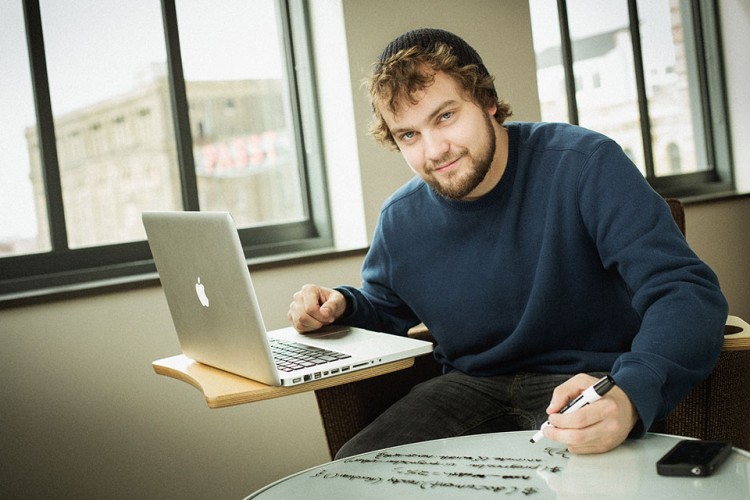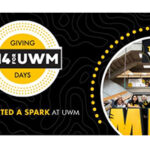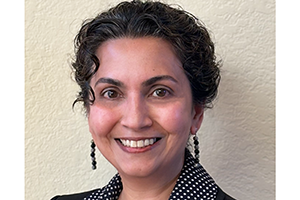From his freshman year of high school, Hunter Ruth knew what he wanted to do. Inspired by a teacher, Ruth focused on becoming a graphic designer and creating video games.
“I definitely benefitted from knowing what I wanted to do,” Ruth says. “That’s the hardest decision you have to make in college. But at UWM, I learned right away that there was much more to the graphic design field than I thought.”
He describes an introductory course on web design in the Peck School as a “great class with way too much information. The professor would fill white boards and your hand would get numb trying to take notes.”
Ruth’s personal “next step” was venturing outside of the Peck School of the Arts for a cross-disciplinary adventure in computer programming.
He looked into the Web Development Certificate program in the College of Engineering & Applied Science, then enrolled in a CEAS class. “It was math-based and really tough—an eye-opener for me. It did teach me how to fail and not give up,” Ruth says with a laugh, adding that he also “learned how to learn” programming languages.
Moving on to a class in the School of Information Studies about native mobile apps, his prior experience with Java meant he could move through the course work and learn Javascript very quickly. The instructor set the course up as an independent study and Ruth began creating a math-based game.
When the focus of the Graphic Design 2 course that Ruth enrolled in this spring was announced, he was ready. For this course in product innovation and design entrepreneurship, students were challenged to identify a problem then create a product to address it.
Ruth’s game for elementary students (K-5) called “Abakus: Math Adventure” fits that description. “It’s basically a supplement to regular math homework, focusing on repetition of math fundamentals, but presented in a more fun and engaging way.”
For Ruth, the game is a response to the issues voiced by his mom and sister, who work in the same elementary school with first and second graders. By the time a teacher realizes there is a problem, teachers say that a student is already behind.
“Abakus: Math Adventure” has students learning and practicing math skills through building their own spaceship and space travel. Through the Abakus mother ship, teachers view students’ participation “live” and observe any learning issues.
“The game eliminates the long loop of children taking homework home, bringing it back, and being graded.”
The next step in launching his own education software company is applying to UWM’s Student Startup Challenge. Ruth already has his test market on board: mom and sister.
Internships have given him insight into running a business. For the past year, Ruth has been working with the tech startup, HarQen, which designs human resources software for banks and hospitals. “I also am a designer and developer for the new UWM Mobile Innovation Lab, nicknamed the The App Brewery – making mobile/web apps for research, student-based and nonprofit organizations.”
While Ruth looks ahead to his next chapter, he deeply appreciates the sense of community fostered by the Peck School’s design and visual communications program. “I launched a Facebook page during my sophomore year and invited all of the designers I had classes with to join. Now, there’s about 50 or 60 members that are actively posting. While it began as a tool for feedback and critiques, it’s become more for supporting each other and seeing how everybody’s progressed.”
More info on Abakus: Math Adventure.
More info on the Student Startup Challenge.







